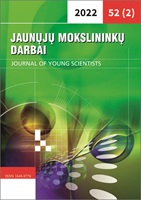Formalųjį švietimą papildančio muzikinio ugdymo proceso kokybės tobulinimas taikant savivaldų mokymąsi: atvejo analizė
Improvement of Quality of Music Education Process Supplementing Formal Education through Self-directed Learning: A Case Study
Author(s): Loreta VenslavičienėSubject(s): Music, School education, Sociology of Art, Sociology of Education, History of Art, Pedagogy
Published by: Vilniaus Universiteto Leidykla
Keywords: music education; formal education; self-directed learning; educational interaction;
Summary/Abstract: Music education, which complements formal education, is, in the essence of the realization of its educational process, close to the essence of the self-directed learning process, therefore there are theoretical and practical possibilities for the realization of self-directed learning in a music school. The application of self-directed learning redistributes the power and responsibilities of the participants of the educational process, therefore opportune preconditions are created for the change of the interaction between the pupil and the educator and for the transition from teaching to learning. Therefore, the provision is observed that the implementation of self-directed learning in educational practice changes the quality of the educational process. The article analyzes how the self-directed learning, established in the educational process of a specific music education institution (music school) that complements formal education changes the interaction between the pupil and the educator, what circumstances are significant, what are the links with the quality of the educational process. The analysis of the results of the empirical research allows us to state that teachers understand self-directed learning and its importance theoretically, but teaching itself has not become a natural strategy for organizing the educational process; fragmentary features of pupils’ self-direction are seen, positions of learning power are more characteristic of teachers than pupils.
Journal: Jaunųjų mokslininkų darbai
- Issue Year: 2022
- Issue No: 2 (52)
- Page Range: 38-49
- Page Count: 12
- Language: Lithuanian

